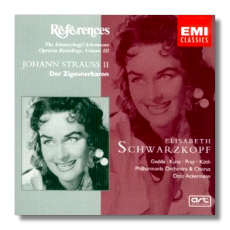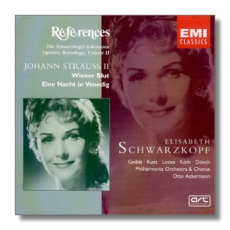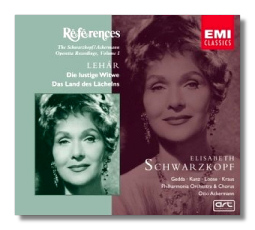
The Internet's Premier Classical Music Source
Related Links
- Latest Reviews
- More Reviews
-
By Composer
-
Collections
DVD & Blu-ray
Books
Concert Reviews
Articles/Interviews
Software
Audio
Search Amazon
Recommended Links
Site News
 CD Review
CD Review
Elisabeth Schwarzkopf

Johann Strauss II
Der Zigeunerbaron
- Elisabeth Schwarzkopf (Saffi)
- Nicolai Gedda (Sándor Barinkay)
- Hermann Prey (Count Peter Homonay)
- Erich Kunz (Zsupán)
- Erika Köth (Arsena)
Philharmonia Orchestra & Chorus/Otto Ackerman
EMI Classics 67535 ADD monaural 2CDs: 56:00, 44:11


Johann Strauss II
Eine Nacht in Venedig (arr. Korngold)
Wiener Blut (arr. Müller)
- Elisabeth Schwarzkopf (Annina/Gabriele)
- Nicolai Gedda (Duke/Count Zedlau)
- Emmy Loose (Ciboletta/Pepi)
- Erich Kunz (Caramello/Josef)
- Karl Dönch (Delacqua/Prime Minister)
- Erika Köth (Franzi)
Philharmonia Orchestra & Chorus/Otto Ackerman
EMI Classics 67532 ADD monaural 2CDs: 79:32, 70:27


Franz Lehár
Das Land des Lächelns
Die lustige Witwe
- Elisabeth Schwarzkopf (Lisa/Hanna Glawari)
- Nicolai Gedda (Sou-Chong, Camille de Rosillon)
- Emmy Loose (Mi/Valencienne)
- Erich Kunz (Gustl/Danilo Danilowitsch)
Philharmonia Orchestra & Chorus/Otto Ackerman
EMI Classics 67529 ADD monaural 2CDs: 79:15, 79:28
There was a time it was assumed that English-speaking audiences couldn't digest Viennese operetta, except in the vernacular, or in very small doses. Early in the LP era, EMI producer Walter Legge thought differently, and he set out to prove it with a series of recordings, of which the five reviewed here (divided among three two-CD sets) are the lion's share. His plan was to use an English orchestra and chorus (the Philharmonia) but to import native German-speaking soloists (with the exception of Nicolai Gedda) who had this music in their blood. It didn't hurt that Legge had married Elisabeth Schwarzkopf, a soprano with fabulous looks and a silvery voice, in 1953 – she was perfect for this repertoire. Conductor Herbert von Karajan was Legge's first choice for these recordings, but ultimately he was engaged only for Die Fledermaus, which finally was completed in 1955. (This has been reissued in EMI Classics' "Great Recordings of the Century" series.) The Romanian conductor Otto Ackermann was a fine choice for these earlier recordings, however. Although it is Schwarzkopf's photogenic face that graces the covers of these three sets, it is Legge and Ackermann who are the artistic driving forces behind them. These three sets are testaments to their vision and practicality.
The only thing wrong with Der Zigeunerbaron (The Gypsy Baron) is that it is not Die Fledermaus. With its gypsy characters and its topicality, it is much less of an exportable product than its more famous sibling. Its music is hardly less fine, however; there are waltzes, but there is a strong Hungarian and gypsy flavor – a paprika that runs through it.
Der Zigeunerbaron is rarely performed on stage as Johann Strauss II wrote it; its recordings tend to be even less authentic. Ackermann and Legge cut several numbers from the score so it would fit on two LPs. (At least they retained some of the dialogue, which was omitted on Clemens Krauss's classic Decca recording.) They also allowed the tenor roles of Homonay and Zsupán to be sung by a baritone and a bass-baritone, respectively. None of this really goes against the common practices of the era, however.
In spite of its lack of authenticity, this 1954 recording remains powerfully attractive. The cast listing has a "Who's Who" quality, but it is good to remember that many of these big stars-to-be were near the start of their careers when this recording was made. Saffi, the gypsy girl who turns out to be the daughter of a Pasha, is not the center of attention in this operetta, yet Schwarzkopf makes the most of her role, and is memorable in her Act One song "O habet Acht." Gedda and Kunz are the focal points, the former sweetly lyrical (at times, he sounds more like a young alto than a tenor), the latter broadly comic, down to his Hungarian accent, which even English speakers can appreciate. Hermann Prey's brief contribution as Homonay also makes a good impression.
Unlike the earlier CD release of this recording, there is a German-English libretto. Unfortunately, the text of the dialogues is still omitted, so it continues to be difficult to follow all of the action.
The Strauss operettas on the next two-CD set are even farther from what the composer intended. In 1923, composer Erich Wolfgang Korngold and librettist Ernst Marischka gave Eine Nacht in Venedig a makeover. One of their reasons for doing so was to make it a vehicle for star tenor Richard Tauber. This wasn't necessarily a bad thing to do: the original libretto was a confusing mess – a poor written hash of mistaken identities. It's still not Shakespeare, but at least it's not completely incomprehensible in this revised version. Korngold cut some numbers, added numbers from other scores, and redistributed the music in one way or another. The result is not bad. Legge and Ackermann performed additional surgery; again, bass-baritone Kunz had to be accommodated with transpositions because Strauss wrote the role of Caramello for a tenor. At the end of Act One, his Gondola Song is given to Gedda's Duke instead. This means that the dramatic irony of Caramello unknowingly sending his Annina off by boat for a romantic evening with the Duke is lost. The culinary delights of this recording include Schwarzkopf as a seller of seafood, and Emmy Loose's and Peter Klein's recipe for beef gravy.
Strictly speaking, Wiener Blut is not Strauss's work at all. A man named Adolf Müller arranged it in 1899 – the year of the composer's death – from the composer's melodies. In this operetta, then, you will hear vocal versions of Strauss waltzes such as Artist's Life, Morning Papers, and of course the title waltz. As music, Wiener Blut as strong. As drama, it is a wreck. The same team who subsequently wrote Die lustige Witwe dreamed up the libretto. Again, mistaken identities drive the plot, which is neither comprehensible nor comic. (It must be said that EMI, as elsewhere, hasn't helped matters by omitting texts and translations of the dialogues in their booklet.)
These two recordings were taped in May 1954. The singing and the orchestral work are up to the same standards set at the Lehár sessions (see below). It seems that the cast has more fun with Eine Nacht in Venedig than with Wiener Blut, and who can blame them?
Lehár's two most popular operettas, with relatively unimportant cuts, fit on the last pair of CDs. These recordings were done back to back in the spring of 1953. Das Land des Lächelns (The Land of Smiles) takes a naïve view of China; this is that country as only the Viennese could have imagined it. The bittersweet story concerns Sou-Chong, a Chinese prince, who takes his Viennese beloved Lisa back to his homeland, only to find that cultural differences make a life together as husband and wife impossible. In a parallel plot line, Lisa's old admirer Gustl falls in love with Sou-Chong's younger sister, with similar results. Sou-Chong's role was written for Richard Tauber, but Gedda steps neatly into his shoes here. The score's big tune, "Dein ist mein ganzes Herz," goes to him. Although Gedda doesn't perform it with Tauber's suave tenderness, it's still an impressive bit of echt -Vienna from a Swedish-Russian singer! Schwarzkopf and Loose are perfectly cast, and even Kunz finds himself in the right place for once, musically speaking, as the lovelorn Gustl.
Everyone knows Die lustige Witwe (The Merry Widow), of course. This was the first of Schwarzkopf's two recordings of the operetta. (The second was done in 1962.) Here she is in fresher voice and less self-conscious, and the only reasons to prefer the later recording, perhaps, are its stereo sound and its slightly less cut score. Actually, a third reason might be Kunz, who finds himself in a pretty pickle here. Danilo's music is too high for him, and so he must take several lower alternatives. These are not terribly effective. Almost out of self-defense, he portrays a rascally, even contrary Danilo – not a romantic figure. As if to compensate, Gedda burns up the microphones with his ardent Camille, and he is sweetly partnered by Loose's Valencienne. Ackerman, reliable as ever, earns extra points for subtlety; even the Act Two ensemble about the difficulty of understanding women is done sensitively and not just for laughs. The original LPs included an overture, but this has been omitted here (as it was on the previous CD release) because, frankly, it is not very good. Again, the libretto contains German texts and English translations of musical numbers, but not of dialogues.
Copyright © 2001, Raymond Tuttle


















